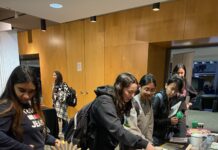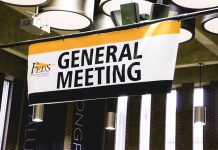Hackathons are tried and true events often seen around the UW campus and are usually composed of CS or engineering students. Anyone unfamiliar with the process may think it would be difficult to be a part of the scene, but it’s not as hard as it seems.
Hayley Whelan, a second-year engineering student specializing in nanotechnology, chose to participate in a recent EngHack after years of sitting on the sideline. She was always curious, but never participated until now. According to Whelan, she had minimal coding experience “because any coding that I’ve done in school is very deconstructed, so it’s just like ‘write code that will execute this specific command.’” Through EngHack, Whelan was interested in broadening her skills.
According to Whelan, her program offers coding courses such as an introduction to Python and some MatLab. This type of coding, however, is more often used for calculations, not the type often associated with building software .
Going in, Whelan stated, “I’m definitely nervous. I’m not at all confident in my coding abilities, so I am worried about what I can get done in 24 hours or getting stuck somewhere.”
Hackathons can be themed or be a learning experience. This event was an opportunity for students to work 24 hours on a project that would later be judged and then presented. Whelan and her partner worked on a web program that would track a user’s savings and spendings for small items such as lunch or coffee. “Things that are really essential to see if you want to use that money for something that will be more worthwhile,” Whelan said.
Once the coding started, Whelan got rid of her nerves and focused on the work. To her, she had to accept that it was okay to not finish something and that it didn’t have to be perfect. “I kind of realized it’s more about learning and stuff like that, rather than having this huge pressure to win.”
In the end, Whelan and her partner were not able to complete their program. While the code worked, the user interface was still unfinished by the end of the hackathon coding period. “It looks good by any standards for sure,” Whelan mentioned.
“It was definitely a huge learning experience,” Whelan said after the coding period. “Being able to kind of write parts of code and stuff, and try to start working towards this and kind of playing around with making a code that actually works … it was really nice.”
Hackathons can be found throughout the year at UW and Whelan believes any student could participate. “Don’t say ‘oh I don’t know how to code, I shouldn’t do a hackathon,’ [or] ‘I don’t know it seems a bit scary,’ just go for it! Maybe do one, and if its fine, do another one later, and it gets better and better and better … you can definitely learn a lot more [about coding] and make a lot more progress then just trying to teach yourself on the side.”






























